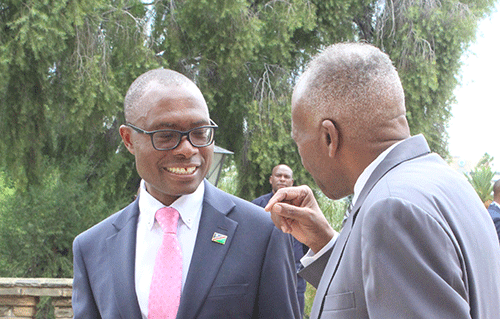Public enterprises must position themselves strategically, as they are an important component for the realisation of emerging industries such as oil, gas and the much-talked-about green hydrogen.
This is because PEs are equipped with the necessary resources to ensure the success of the initiatives.
These sentiments were ventilated yesterday by Martha Domingos, director of legal advice in the PE ministry.
Speaking at the forum launch for legal advisors, company secretaries and compliance officers within various public enterprises, she said it is essential to ensure public enterprises are competitive, efficient and well-governed for the purposes of economic development and public service delivery.
To achieve this, government has invested in the reforms of public enterprises by enacting the Public Enterprises Governance Act (PEGA).
“With the enactment of PEGA in 2019, one of the key challenges we have been faced with is the absence of the accompanying institutional frameworks, for example
the requisite regulatory mechanisms and governance frameworks, which makes implementation a challenge, contributing to the low compliance culture within our various public enterprises in Namibia,” Domingos stated.
State-owned enterprises (SOEs) have been called out over the years for their association with corruption, nepotism, mishandling of public finances, gross incompetence and abuse of power.
Persistent corruption and other irregular actions cost PEs money, damage their brand and reputation, distort markets, erode public trust, and undermine domestic and foreign investor confidence.
Acting director of governance and financial advice in the public enterprise ministry Martha Simasiku took issue with the lack of compliance with these institutions, saying their performance must improve.
Addressing the same gathering, Simasiku stated the ministry has a PEs financial monitoring system that currently only has 69 insititutions on it.
“On the system, there are 39 non-commercial PEs with a compliance rate of 44%. There are seven extra budgetary enterprises at 86% rate and 23 commercial PEs that are taking the large portion of government funds, but having a compliance rate of 61%,” he said.
Billions
Towards the end of last year, Namibia had 81 commercial and non-commercial PEs.
The total asset value of commercial PEs stands at N$120 billion and liabilities at N$60 billion, with net value assets at N$60 billion.
The SOEs employ around 25 000 people.
Simasiku further pointed out some challenges encountered.
This includes PEs as not submitting required documents on time, lack of timely audited financial statements, non-performance of Pes, especially financially, as well as board members not attending meetings.
“The ingredients of success in the management of PEs lies in ensuring that there is compliance. This will enable PEs to compete with the private sector and other similar entities.
It is for this reason that we have been focusing on necessary reforms that will enable PEs to perform effectively, and become the catalyst for national building,” Simasiku added.
Public enterprises minister Iipumbu Shiimi has already slammed some State-owned enterprises for their poor performance and ineffective service delivery.
The finance minister mentioned it is worrisome these enterprises compete with government resources that are supposed to fund critical public services.
He emphasised that the ultimate purpose of the State’s ownership of PEs is to maximise value for society through the efficient allocation of resources.
“The fiscal risks from the operations of public enterprises have increased significantly through both requests for budgetary allocations as well as settlement of government guaranteed loans,” the minister said last year.
OMAs
To champion public service management for the current financial year, N$73.5 million has been budgeted.
It is under this programme that the Office of the Prime Minister coordinates the management of the public service through ensuring an appropriate governance framework, and to enforce compliance by all government offices, ministries and agencies (OMAs).
Also, this year, OPM started drafting the Public Sector Administration and Management Bill, and initiating the public service skills audit to determine the competency requirements, and ensure fit-for-purpose structures in OMAs.
For the improvement of the constitutional obligation of the Public Service Commission,
N$35.3 million will be needed.
To improve information technology in the public service, N$80 million is earmarked.
“Through this programme, the office provides IT support to OMAs, including coordination of the automation of government services (e-government). Part of the allocation is for acquisition of IT infrastructure, such as hardware (servers), to capacitate the hosting environment for online IT solutions,” Prime Minister Saara Kuugongelwa-Amadhila said earlier this year while motivated the OPM budget.



